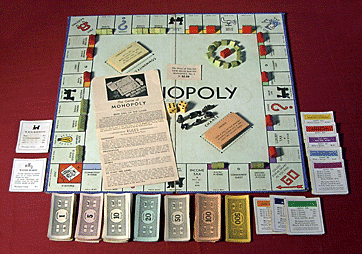Board or Card? - Rather than researching directly into Hasbro, I have made some primary research and found out about what form of party games people prefer to play. After asking a small group of 19-21 year olds, I have discovered that the majority of people prefer to play card games than board games, purely because it is easier to set up, more straightforward to understand and very portable.
The Hasbro brief states that games should take no longer than 2 minutes to learn. I have analysed a variety of games and it has become clear that card games are much quicker to learn. For this reason I am going to focus initial ideas on card games.
Snap Instructions (Card)
Trivial Pursuit Instructions (Board)
Uno Instructions (Card)
Cluedo Instructions (Board)
Interactive Games - When researching into old games I came across Bram Stoker's 1992 Dracula Board Game. The rules of the game are fairly complex; however, what is interesting about the game is that it is extremely interactive. Players must move around their house/surroundings and avoid the player who draws the Dracula card. The game revolves around a tape of music, that must be played out loud in the player area.
This game has inspired me to make some ideas about how the board/cards themselves do not have to be the sole focus of the game. Simple, clear instructions are necessary to ensure that the game is fun and understandable.
 Nostalgia - The brief states that 16-26 year olds should be the main target audience for ideas. This is important to consider as age groups played different games when growing up. 16-26 year olds would have been at school roughly between 1998-2013 (in terms of primary school in the UK). Being 21 years of age, I am the average age in the set target audience. This brief therefore allows me to research into past games, but also consider games that I played as a child to try and use nostalgia to inspire new ideas.
Nostalgia - The brief states that 16-26 year olds should be the main target audience for ideas. This is important to consider as age groups played different games when growing up. 16-26 year olds would have been at school roughly between 1998-2013 (in terms of primary school in the UK). Being 21 years of age, I am the average age in the set target audience. This brief therefore allows me to research into past games, but also consider games that I played as a child to try and use nostalgia to inspire new ideas.Personally, school-ground games that I remember are tag, conkers, Beyblades, Yu-Gi-Oh! and Top Trumps, whilst card and board games I remember include Kerplunk, Jenga, Uno, Cluedo, Monopoly and Scrabble.
Hunt The Thimble
This is a party game in which all but one partygoer leaves the room. The person remaining in the room hides a small object somewhere in the room. When everyone comes back in, they must locate the hidden object.
Simon SaysBeing one of the most popular traditional children's games, the concept of this game is that one player takes the role of "Simon" and issues instructions to the other players, which should only be followed if prefaced with the phrase "Simon says". Players are eliminated from the game by either following instructions that are not immediately preceded by the phrase, or by failing to follow an instruction which does include the phrase "Simon says". It is the ability to distinguish between genuine and fake commands, rather than physical ability, that usually matters in the game; in most cases, the action just needs to be attempted.
Tag
Tag is a playground game that involves three or more players chasing other players in an attempt to "tag" or touch them, usually with their hands. Usually when a person is tagged, the tagger says, "Tag, you're it".
Previous Winners - To see what was successful in last year's Hasbro competition, I have analysed the winners of 2017. The winners tended to use two approaches. Firstly, the majority of winning games are very simple - design wise many use stripped down colour palettes and are minimal, whilst the game instructions are very easy to understand. Secondly, many of the winners have film footage of the game being played, which is one aspect we didn't do last year in our submission. These two points will be considered when developing ideas forward.




















No comments:
Post a Comment